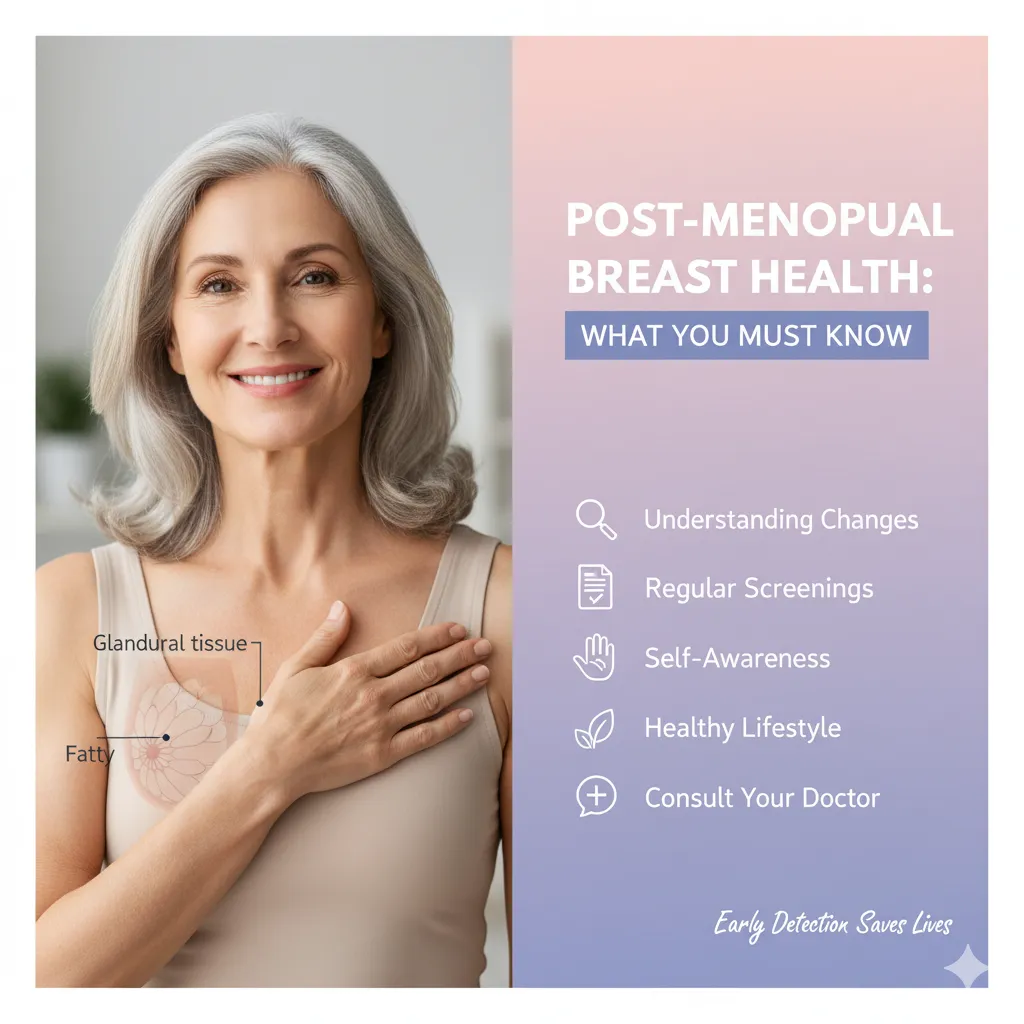
Seeing Is Believing: The Benefits of Ultrasound for Patients and Providers

Post-menopausal Breast Health: What You Must Know (and Do)
Post-menopausal Breast Health: What You Must Know (and Do)
The hormonal environment shifts dramatically at menopause and your breast tissue follows. Knowledge = power.
As WebMD puts it: “Your levels of estrogen drop dramatically. Because the milk system starts to shut down, glandular tissue shrinks, gets replaced by fattier tissue, size/shape change.”
The decline in estrogen & progesterone leads to:
Interestingly: while breast pain (mastalgia) is more common before menopause (due to cycle/hormonal swings), after menopause it typically decreases. If you’re getting new, persistent pain, that means you need to pay attention.
Bottom line: Your breast tissue is changing. That’s normal—but “normal” doesn’t mean “never check.” Because the risks shift.
2. Why post-menopausal breast health matters more
You’ve exited the high-hormone reproductive phase, but new risk vectors open up.
Age is one of the biggest risk factors for breast cancer. Even if you’ve done nothing “wrong,” post-menopausal age means higher base risk.
Body composition matters: More fat tissue, higher BMI, weight gain after menopause → increased risk. Fat tissue produces estrogens; higher estrogen exposure after menopause elevates breast cancer risk.
Hormone Replacement Therapy (HRT): If you’re using HRT (especially combined estrogen/progestogen), be aware it increases breast tissue stimulation and may raise risk.
Screening becomes critical: With the reduced density but higher risk, you must maintain vigilance with mammograms, clinical exams, and changes in self-awareness.
No excuses: “I’m older so I guess it will be okay” is the wrong mindset. It’s precisely at this moment you must lean into monitoring and prevention.

3. What to monitor / red-flags you can’t ignore
Be your own detective. Here’s what is “normal change” vs what is “go-to-doctor now”.
Normal changes you may see:
Breasts feeling less firm, slightly different shape, maybe some sagging.
Occasional tenderness (though less than before).
Small benign lumps or cyst-like changes (though they still need checking).
Red flags:
A new lump or mass in one breast (especially persistent or hard).
Changes in skin over breast (dimpling, puckering, redness).
Nipple changes (discharge, inversion, scaling).
Persistent or worsening breast pain after menopause (especially if isolated to one side).
Changes in size/shape rapidly.
Action trigger: If you see any red flags, don’t wait. Get imaging (mammogram + ultrasound) and clinical assessment. Normal aging is one thing; ignoring possible signs of disease is another.
4. Concrete steps you must take - your priority list
Enough theory. Time for a “what you must do” list. I expect you to pick at least one item per week (if not daily) to build habits.
Schedule regular screening
Breast self-awareness – monthly habit
Pick a date each month. Look for changes in shape, texture, lumps, skin & nipple changes.
Document any change and if something is new/unusual, call your doctor.
Control your weight/composition
Lifestyle tweaks
Limit alcohol: even moderate intake increases breast cancer risk.
Diet: anti-inflammatory, high in fibre, rich in fruits/vegetables. Processed food, high-fat diets correlate with more risk.
Supportive bra / fit matters: Especially as shape changes, the wrong bra can cause discomfort and obscure changes.
Discuss HRT consciously
If you’re using or considering HRT (hormone replacement therapy), weigh benefits vs risks with your doctor. There’s no one-size-fits-all.
Keep medical history on file
Document any benign breast disease, lumps, cysts, diagnoses. It matters for future risk stratification.
Share with your doctor.

5. What many people avoid (but you must face)
Because this is where most founders / high-performers like you drop the ball.
Avoidance of discomfort or ignoring change. “Oh it’s just sagging… it’ll be fine.” No. That kind of make-believe lets risk creep in.
Thinking past screening matters less. Wrong. It matters more now that you’re post-menopausal.
Assuming “age means I’ll get it anyway, so why bother?” That’s fatalism. Wrong mindset. Prevention + early detection do work.
Lifestyle neglect. You might be busy building, leading—but your body is still your machine. Letting weight slip, letting movement drop, is a recipe for higher risk.
Delaying specialist consultation. If you suspect something, delay costs you. The earlier you act, the better.
6. Strategic next steps for you
Given your role, your schedule, your priorities—I suggest you treat this like a “founder’s health sprint”.
This week: Book your screening (if due). Mark a monthly bell for self-breast exam (e.g., first Monday of each month).
This month: Audit your lifestyle: how many days you moved, what’s your waist size, check your bra fit. Set a target (e.g., NDW = number of days workout per week; waist target).
This quarter: If you’re using HRT or any hormone therapy, have a full review with your doctor about breast-health implications.
Ongoing: Set up “breast health” in your calendar—like a quarterly check-in. Every 3 months evaluate: any changes? any screening results pending? Lifestyle trending?
Emergency plan: If you detect any red flag (see section 4), you must escalate: imaging, doctor consult. No “wait and see”.
You’re not a passive observer of your health. As a high-achiever you know that control, discipline and systems matter—apply the same to your body. Post-menopause isn’t the time to relax vigilance—it’s time to ramp it up.
If you commit to being proactive, you dramatically increase your odds of catching anything early, and maintaining strong breast-health well into the future.
For those seeking expert ultrasound services, Atlanta Ultrasound offers quick, efficient, and comprehensive scans. Our team of skilled professionals is dedicated to providing you with the clarity and care you need.
Contact us today to schedule your ultrasound scan and take a decisive step towards understanding your health.
📍 Multiple locations in Metro Atlanta, GA
📞 Contact: 678-590-3300
🌐 Website:www.atlantaultrasound.com
Disclaimer: The content of this blog post, authored by a sonographer, is provided for educational and informational purposes only. It is not intended as medical advice, nor should it substitute for professional medical consultation, diagnosis, or treatment. Always seek the advice of your physician or other qualified health providers with any questions you may have regarding a medical condition or health concerns.
